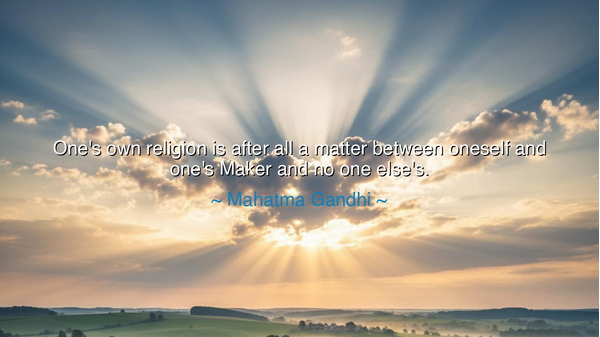
One's own religion is after all a matter between oneself and
One's own religion is after all a matter between oneself and one's Maker and no one else's.






"One's own religion is after all a matter between oneself and one's Maker and no one else's." These powerful words from Mahatma Gandhi speak to a fundamental truth about the deeply personal nature of religion. Religion, in its purest form, is a sacred relationship between an individual and the divine—between humanity and its Creator. This bond is not something to be dictated or judged by others, but a sacred path that each person must walk according to their own conscience and understanding. Gandhi teaches us that religion is not a matter of external influence or social conformity, but an inward journey that transcends the judgment of others.
In the ancient teachings of the great sages, religion was always seen as a deeply personal pursuit. Buddha taught that enlightenment was found not through adherence to dogma, but through the individual’s own practice and experience. The sacred was not to be found in outward rituals alone, but in the heart of the practitioner. Similarly, in the Hebrew Bible, we find that God seeks those who worship in spirit and truth, not those who merely follow the rituals of the temple without sincerity. Religion, in its deepest sense, is a private relationship—a direct connection between the soul and its divine source.
Consider the life of Socrates, the great philosopher who rejected the conventional religious practices of his time. He was not hostile to the divine, but instead sought to understand the gods through reason, reflecting deeply on the nature of the soul and its relationship to the divine. His beliefs were not born of societal pressure, but from a personal quest for truth. This is the essence of what Gandhi expresses: the truth of one’s religion is found within, and it is shaped by the individual’s own journey, not by the expectations or judgments of others.
Gandhi himself was a living embodiment of this idea. He was a devout Hindu, yet he embraced the truths found in many different religious traditions—whether it was Christianity, Islam, or even Judaism. He believed that all paths that lead to truth and compassion were valid, and he urged others to find their own spiritual path, free from the constraints of external judgment. Gandhi was often criticized by those who believed that he was not sufficiently orthodox in his Hinduism or that he was too open to the spiritual practices of other religions. Yet, he remained resolute in his belief that faith was a matter of personal conviction and that it was not for others to dictate what one must believe.
In the context of the Indian independence movement, Gandhi’s philosophy of self-reliance in faith extended to his political work as well. He sought to unite people not through imposed ideology, but through a shared commitment to truth, non-violence, and the well-being of all people. His message was not one of religious uniformity, but of unity in diversity. In the face of religious and ethnic divisions, he called for people to honor their individual beliefs while working together for a common good. This was no easy task, yet his ability to maintain a sense of integrity in his beliefs, while embracing others’ right to their own, was one of the most powerful aspects of his leadership.
The lesson of Gandhi’s words is that religion is not something to be dictated by the external world, but something that must come from within. It is a personal matter, a private relationship with the divine that cannot be prescribed or judged by others. Faith is not a tool for societal control, nor is it something to be used for division or judgment. It is, instead, a journey of self-discovery and sincerity, where each individual must seek their own connection with the divine and live according to the truths they uncover.
In our own lives, we must remember that the truth of our faith lies within us. We should not allow the expectations or judgments of others to shape our beliefs. Rather, we must take the time to reflect deeply on our own hearts, to understand what we truly believe, and to live in accordance with that truth. Just as Gandhi did, we should cultivate a deep sense of respect for the beliefs of others, understanding that each person’s journey to the divine is deeply personal and sacred. Let us walk our own paths with integrity and humility, honoring the divine within us and in others.






AAdministratorAdministrator
Welcome, honored guests. Please leave a comment, we will respond soon